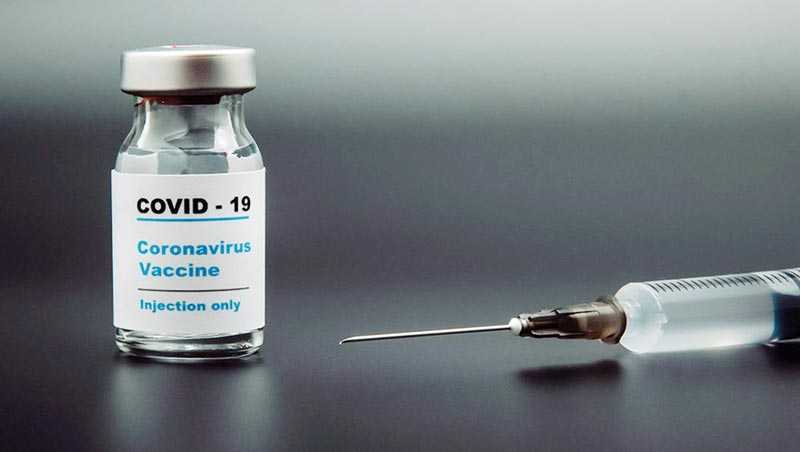Sunday Feb 22, 2026
Sunday Feb 22, 2026
Monday, 18 January 2021 00:00 - - {{hitsCtrl.values.hits}}

The speed with which multiple vaccines have been developed and the purported efficacy of the treatments are a huge tribute to how quickly science has developed in the past century, since the great Spanish Flu pandemic of 1918
 The first death attributed to a ‘novel coronavirus’ named COVID-19 occurred on 10 January 2020. The first case detected outside China was confirmed in Bangkok, Thailand on 13 January that year. The day before that, Chinese scientists had released the genetic sequence of the newly-identified virus, and the world was slowly waking up to what would soon become a living nightmare, with more than 1.9 million deaths attributed to the virus since then.
The first death attributed to a ‘novel coronavirus’ named COVID-19 occurred on 10 January 2020. The first case detected outside China was confirmed in Bangkok, Thailand on 13 January that year. The day before that, Chinese scientists had released the genetic sequence of the newly-identified virus, and the world was slowly waking up to what would soon become a living nightmare, with more than 1.9 million deaths attributed to the virus since then.
Thailand, which welcomed 39.80 million tourists in 2019 (10.99 million of them from China), saw numbers fall to zero in the second and third quarters of 2020, despite dealing with the pandemic more successfully than many other nations. This sort of precipitous ‘fall off a cliff’ has been the norm for most countries dependent on international tourism.
Differential impact
For reasons that scientists do not yet understand, the infection and death rates have been markedly dissimilar in different parts of the world. The USA and many European countries appear to be more badly affected than other nations. The list of countries with COVID-19 deaths exceeding 1,000 per 1 million of population (i.e. 0.1%) is almost exclusively in the western hemispherei: Belgium, Italy, Spain, the UK, Hungary, France and a few smaller European countries joining the USA, Mexico, Panama and Peru in having the most deaths per capita.
Asian and African countries are notably absent until Iran appears on the list at number 40 and South Africa at 42. Whether this is a reflection of better data-gathering, or some sort of intrinsic resistance to the disease, will only be known later once the numbers are fully analysed. For the moment it must remain one of the many baffling features of this pandemic.
A host of vaccines
The speed with which multiple vaccines have been developed and the purported efficacy of the treatments are a huge tribute to how quickly science has developed in the past century, since the great Spanish Flu pandemic of 1918.
At the time of writing, 12 vaccines are in advanced clinical trials with 10 of them approved for emergency or limited useii. The Pfizer-BioNTech vaccine was the first to be approved and is being deployed at the moment. But the requirement for the vaccine to be stored and transported at a temperature of minus 70°C makes it challenging for use in parts of the world with poor infrastructure.
Moderna (of Boston, USA) has a vaccine that gained emergency authorisation and is also being used currently. Both these vaccines use mRNA techniques, a highly advanced method that hasn’t been widely used previously and requires very cold storage. But President Trump has banned the export of vaccines produced in the USA, so for the moment the rest of the world has almost no access to these two products.
The Oxford/AstraZeneca vaccine from the UK, which does not use mRNA as a base and therefore can be transported at more ‘normal’ refrigerated temperatures, has also received emergency approval. It is being manufactured not only in the UK but also in Pune, India, and has been approved for emergency use in several countries.
Russia has approved the Sputnik V vaccine that is also being administered by many countries including Brazil, Argentina, Mexico, Serbia and Belarus. Unconfirmed reports state that Sri Lanka has opted for this vaccine as well as the Oxford one produced in India. China too has produced two vaccines that are in the process of being distributed.
Will universal vaccination be the answer?
The tiny Pacific island nation of Palau (population 18,000) is likely to be the first in the world be fully vaccinated. Ironically, the country has not recorded a single case of COVID-19 due to its isolation. But small islands apart, the logistics of vaccinating a nation’s entire population is a daunting task. Israel, with its population of nine million, an advanced health care system, and deep pockets, expects to be the first sizeable country to achieve near-universal vaccination by March 16, 2021iii.
The city-states of Singapore and Dubai (both home to huge airlines dependent on international travel) also intend to vaccinate their entire populations in the next month or two. Interestingly, Dubai and neighbouring emirate Abu Dhabi seem to be taking different approaches to the issue within the same country. Dubai has remained open to tourism, particularly from the UK, while Abu Dhabi, capital of the United Arab Emirates (UAE), has greatly restricted inbound travel.
Other countries such as New Zealand, which has controlled the virus well, and Australia, which has had a few clusters but no prolonged pandemic, are taking a more measured approach. Neither nation will commence mass vaccination for another month or two. Meanwhile, the borders of both countries are closed to foreign travellers. Only returning residents are permitted to enter, but they must all quarantine for 14 days, a stance that many countries have adopted. The proposed ‘travel bubble’ between Australia and New Zealand never transpired as the virus has continued to leak from quarantine, infecting local populations.
When can we expect ‘normal’ international travel?
The rollout of vaccinations in the USA has been dogged with supply chain and logistical issues. With various states, and even individual counties, taking different approaches to the challenge, universal vaccination is probably many months away in that country.
As more infectious variants of the virus continue to spread, international travel has taken another downturn. It has become obvious that airline crews are a vector of transmission, and most countries are now restricting their movements. Some, like Australia, insist on testing crew members on arrival, and will not allow passengers on the outbound flight should a crewmember have a positive test result.
A ‘vaccine hierarchy’ is developing, with wealthier countries able to secure an early supply of doses far in excess of what they need, while the middle and low-income world gets pushed down the queue. How this will change global tourism movements remains to be seen, but it will definitely have an effect. Evidence indicates that even though inoculated against COVID-19, an individual can remain infectious and spread the virus to others. In a world where the wealthy have received their vaccine and the poor have not, this has immediate concerns.
In the meantime the travel industry is bracing for a spurt of ‘tantrum travel’, as wealthy consumers who have been unable to leave their home countries take the first opportunity to travel anywhere accessible. But this is expected to be short-lived as destinations will be limited and costs high.
Some type of digital travel pass that contains vaccination data will probably become a necessity; but without a common, universal standard it will be difficult to implement. Meanwhile, testing pre-departure and on arrival, mandatory in-flight masks, and reduced service on-board, will be the new normal. All this will add to processing times at airports, thereby frustrating passengers to an even greater degree.
While the number of airline bankruptcies has been relatively low in 2020 (compared to other years) there is a growing realisation in the industry that the worst may not be over. We may be seeing the ‘end of the beginning’ of this global pandemic (to paraphrase Winston Churchill), but there still is a long way to go before we can expect to restore the travel patterns of 2019. Whether the planet can afford a return to the carbon output caused, is another matter entirely.
Footnotes:
ihttps://www.worldometers.info/coronavirus/
iihttps://www.nytimes.com/interactive/2020/science/coronavirus-vaccine-tracker.html
iiihttps://www.news.com.au/world/israel-plans-to-vaccinate-everyone-by-march-heres-how/video/37e8423cdc0964996869139a3706c8d6